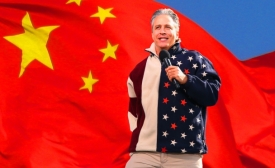digital diplomacy
I had to laugh when I heard about the U.S. Agency for International Development’s botched effort to create a Twitter-like platform for Cuba intended to undermine the communist regime. Even the name — ZunZuneo — to the State Department’s credit, sounded like something cooked up in Silicon Valley, not Foggy Bottom.

An exclusive interview with Gudabaihua (谷大白话) on American late-night talk shows.
Afghans have long been resistant to central authority — as the United States has found to its frustration — with Afghanistan divided along tribal, cultural, religious and linguistic lines. Its mountains and valleys have stood in the way of communications breakthroughs that have unified other societies.
Most people can pretty much agree that a free and open Internet is extremely important for a number of reasons, but few major American politicians have gone on the record saying so. Many have come out in favor of net neutrality, but few have gone as far as to call the Internet a right. That is, until now.
On April 22nd, embassy communicators, journalists, thought leaders, and millions of online followers convened in Washington, DC to discuss how—and if—diplomacy has changed with technology. The consensus was that diplomacy will always be built on personal relationships and face-to-face interactions.
On April 22nd in Washington DC, the Diplomatic Courier, United Nations Foundation, and the Digital Diplomacy Coalition held an event exploring the future of public diplomacy in the digital age. People around the world joined the conversation through Twitter and Livestream, bringing questions and insights from countries such as Nigeria, Australia, Mexico, and Turkey.
Of the world’s seven billion people, about 2.4 billion have access, in some way, to the Internet. The ability to connect many-to-many has led to some remarkable events and phenomena in recent years. The tools did not cause the Arab Spring, but they did allow for better organizing, amplification of messages, and the ability to show the world what was happening minute-by-minute, tweet-by-tweet.
For the past decade the Molotov song “Gimme the Power” has served as an anthem of youth rebellion decrying corrupt police and politicians in Mexico. This week, its lyrics became the banner under which thousands of young people protested online and in the streets against Mexico’s new telecommunications law, which they believe infringes on their civil rights.







